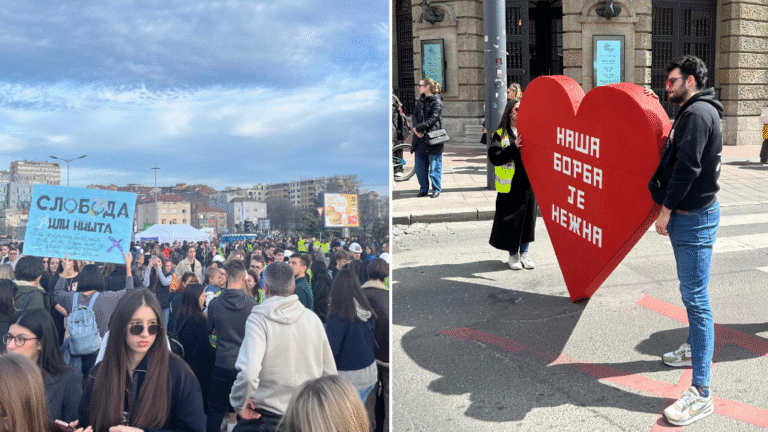As Serbia’s EU aspirations face mounting challenges, students and Brussels speak with one voice. While President Vučić courts Moscow, Serbia’s youth rally for rule of law, democracy, and justice. From mass protests to relay marathons, their movement echoes EU demands — just as Brussels warns that future accession hinges on reform, not rhetoric, writes Milos Stanovic, Programme Officer at Civil Rights Defenders, Belgrade Office.
As Serbia balances on the cusp of its next great transformation, the country’s push for European Union membership has come under renewed scrutiny, both in Brussels’ corridors of power and on Serbia’s own streets.
With EU Commissioner for Enlargement Marta Kos’s visit to Serbia, Picula’s recommendations and the student protests escalating, the next few months will be crucial for Serbia. When she arrived in Belgrade on April 29th, Commissioner Kos made it clear that Serbia’s path to accession hinges not on ceremonial handshakes, but on concrete reforms to the judiciary, free media and fair elections.
Addressing President Aleksandar Vučić and the newly appointed Prime Minister Đuro Macut, Kos emphasized that “without these changes, Serbia cannot progress” and that Brussels’ demands “are very close to the demands of the citizens who were protesting on the streets of Serbia”. In her meetings with civil society representatives and student leaders, she paid tribute to the victims of the Novi Sad station tragedy.
On May 7th in Strasbourg, the European Parliament’s standing rapporteur for Serbia, Tonino Picula, presented his first annual report, warning of “widespread systemic corruption, nepotism and a lack of oversight mechanisms”, symbolized by the fatal canopy collapse in Novi Sad last November.
Picula’s resolution specifically calls for an impartial investigation into allegations that an illegal sonic weapon was deployed against peaceful demonstrators during the March 15th protest in Belgrade, and it urges Serbian prosecutors to hold accountable those who ordered or executed the violence under the guise of public order.
Meanwhile, President Vučić’s decision to attend Russia’s Victory Day parade in Moscow on May 9th provoked unease among EU allies. His flight was halted in Baku after Lithuania closed its airspace – part of a broader Baltic refusal to facilitate trips that could be interpreted as endorsing Moscow during its ongoing war in Ukraine.
From mourning to mobilisation
Against this backdrop of high-level diplomacy, Serbia’s students have transformed grief into ingenuity. What began as a spontaneous outpouring of sorrow and anger after the Novi Sad train station canopy collapse evolved into a sustained, nationwide movement demanding justice and systemic change. Each successive action organised by the students has been both symbolic and strategic.
When students blocked the Autokomanda highway intersection on January 27th, they effectively halted one of Belgrade’s busiest arteries to dramatize the idea that until corruption is rooted out, everyday life in Serbia remains in gridlock.
In Novi Sad, they turned Liberty, Žeželj, and Varadin bridges into a stage for 24-hour blockades – shutting down the so called “Three Bridges” to mark three months since the canopy collapse and press for prosecutions of contractors and officials. After Novi Sad, masses gathered in Kragujevac, Niš and in Novi Pazar – where students styled their demonstration as a union of cultures and religions to counter President Vučić’s polarizing rhetoric, spreading the movement’s reach and its message of unity.
On March 15th in Belgrade, what became the largest single protest yet was met not with dialogue but with an illegal use of a sonic weapon, as unidentified individuals or groups attempted to disperse tens of thousands of protestors or cause severe harm through panic and stampede. This incident is still being investigated and the resolve of this incident has become the fifth students’ demand.
Turning advocacy into creative endurance events on the roads to Europe, students organized a 1400 km bike ride to Strasbourg in late April, to deliver a petition urging MEPs to safeguard Serbia’s accession process by demanding real rule of law reforms. Yet the latest display of creativity came on April 25th, when a relay ultramarathon set off from Novi Sad bound for Brussels, nearly 2000 km over 18 days, each runner handing off a petition demanding that EU institutions “uphold their own values of democracy and rule of law”. They reached Brussels on May 12th.
Alongside these innovative tactics, students begun demanding snap elections as the only way to restore legitimacy to Serbia’s parliament, which they argue has been compromised by repeated abuses of public office, electoral manipulation and other forms of misuse of power.
Snap elections, already a familiar tool in Serbia’s volatile political landscape, often used by Vučić and the governing party, would now allow citizens to reset the political calendar and hold ruling parties to account without waiting until the regular elections in 2026. The government, however, dismisses the call as a destabilising ploy, insisting that the next regular elections will suffice and accusing protesters of trying to weaponise democracy for their own ends.
All these campaigns intersect powerfully with Serbia’s EU trajectory. Brussels has shown it can leverage accession talks, not as empty promises but as genuine incentives for reform. Kos’s insistence that EU and student demands align, and Picula’s call for legal accountability, have given the movement an external echo in which to amplify its voice. At the same time, Vučić’s pivot to Moscow adds to the geopolitical tightrope Serbia is walking.
With Kos’s visit to Serbia, Picula’s recommendations and the student protests escalating, the next few months will be crucial for Serbia.


